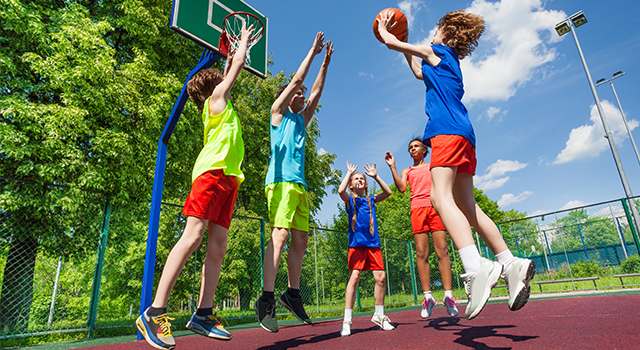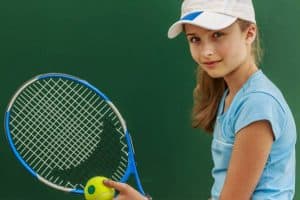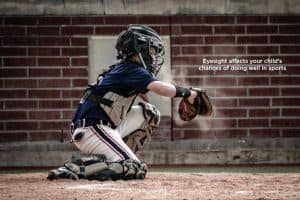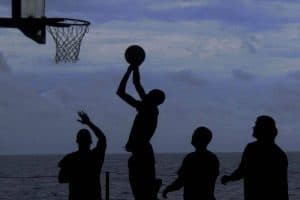Positive sports experiences are not only fun, but are also essential in building a child’s self-esteem.
Does your child enjoy playing sports but still finds their skills are not as good their friends?
Your child may have a vision problem.
Children are born with an innate desire to play— with about anything they can get their hands on. Many children have an inborn athletic gene, while other children would love to be able to play sports, but for some reason cannot successfully perform when given the chance.
Poor sports performance can cause low self-esteem, and feelings of frustration and embarrassment. A child who cannot catch a ball or jump rope like their friends, may begin to avoid these activities— causing them to feel left out and insecure.
The good news is— many times, sports performance is closely related to the integrity of a child’s visual skills.
In other words, the child may have a visual problem that is causing their inability to perform well in sports activities.
Is a vision problem impacting your child’s sports performance?
Common signs that a vision problem is impacting your child’s sports performance:
- Dislikes team sports
- Diminished interest in sports
- Difficulty catching or throwing
- Inability to see the ball clearly
- Struggles to track the ball or other players
- Over or under estimates distances
- Poor sports performance even with strong athletic skills
- Improvement is not noticed even with practice
- Difficulty remembering plays
If you want to improve your sports performance, contact an eye doctor near you, who can discuss how to take your game to the next level.
SEE RELATED: 5 Tips to Improve your Game
Are vision skills for sports different than vision skills for learning?
Actually, they are very similar.
Vision problems that affect sports performance can also affect your child’s ability to learn in the classroom.
For example, sports activities require accuracy and speed for optimal performance. If a child cannot see a ball clearly as it flies through the air (eye tracking), or know where to stand in order to catch the ball (visual perception), they will not play the game well.
Similarly, if a child has poor eye tracking or visual perception skills, they may have difficulty with reading and comprehension.
Visual skills necessary for sports performance
- Dynamic visual acuity- the ability to see moving objects clearly
- Eye tracking- the ability to keep your eyes on the ball at all times
- Eye focusing- the ability to change focus quickly and accurately between two distances (near and far)
- Peripheral vision- the ability to see images and objects “out of the corner of your eye” while fixating on a target
- Focusing flexibility and stamina- the ability to maintain clear vision at all distances even under high speed and physically stressful situations
- Depth perception– the ability to quickly and accurately judge the speed and distance of objects
- Eye-hand coordination is your body’s ability to react to incoming visual information with accurate hand movements
If your child shows signs of a vision problem, schedule a comprehensive vision evaluation with your eye doctor to assess the integrity of your child’s visual skills.
Vision therapy for sports
If a vision problem is detected, your child may be a great candidate for vision therapy.
Vision therapy eye exercises retrain the visual system to correct many vision problems and enhance sports performance.
Eye protection for sports
Did you know that sports activities are the most common cause of pediatric eye injuries?
- Over 100,000 sport-related eye injuries are reported every year.
- 90% of sports-related eye injuries can be prevented with eye protection.
Most sports-related eye injuries can be prevented through the use of protective eyewear such as sports goggles, wrap-around polycarbonate lenses, or side shields— you may have seen basketball players wearing these types of frames.
Protective eyewear can be purchased with prescription lenses so children can see clearly while playing their favorite sport— without the risk of getting injured.
Protective eyewear is essential for all sports such as hockey, basketball, football, soccer, baseball, tennis, and any other sport where the child is in motion. Regular eyeglass frames will not provide enough protection and can easily be damaged.
If your child is involved in sports on a regular basis, or enjoys playing catch in the backyard, ask your eye doctor to recommend specific sports eyewear that will protect your child from an eye injury.
LEARN MORE: Guide to Sports Vision
Schedule a vision evaluation to determine if your child’s sports performance can benefit from a program of vision therapy.
Does your child enjoy playing sports but you feel their game could be improved?
Your child may have a undiagnosed vision problem and sports vision training could the solution to take their game to the next level.










